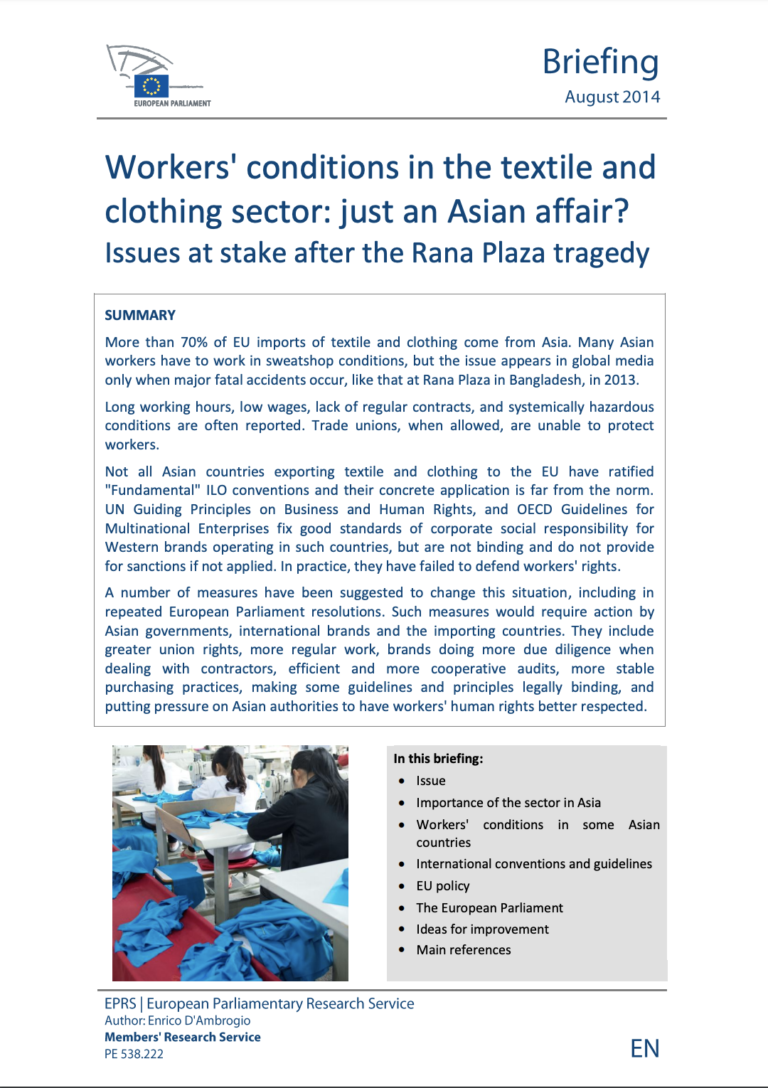Guiding Principles on Business and Human Rights
The UN Guiding Principles on Business and Human Rights are a set of guidelines for States and companies to prevent, address and remedy human rights abuses committed in business operations. child labour
Written by Enrico D’Ambrogio
More than 70% of EU imports of textile and clothing come from Asia. Many Asian workers have to work in sweatshop conditions, but the issue appears in global media only when major fatal accidents occur, like that at Rana Plaza in Bangladesh, in 2013.
Long working hours, low wages, lack of regular contracts, and systemically hazardous conditions are often reported. Trade unions, when allowed, are unable to protect workers.
Not all Asian countries exporting textile and clothing to the EU have ratified “Fundamental” ILO conventions and their concrete application is far from the norm. UN Guiding Principles on Business and Human Rights, and OECD Guidelines for Multinational Enterprises fix good standards of corporate social responsibility for Western brands operating in such countries, but are not binding and do not provide for sanctions if not applied. In practice, they have failed to defend workers’ rights.
A number of measures have been suggested to change this situation, including in repeated European Parliament resolutions. Such measures would require action by Asian governments, international brands and the importing countries. They include greater union rights, more regular work, brands doing more due diligence when dealing with contractors, efficient and more cooperative audits, more stable purchasing practices, making some guidelines and principles legally binding, and putting pressure on Asian authorities to have workers’ human rights better respected.

The UN Guiding Principles on Business and Human Rights are a set of guidelines for States and companies to prevent, address and remedy human rights abuses committed in business operations. child labour
The OECD Guidelines for Multinational Enterprises are recommendations addressed by governments to multinational enterprises operating in or from adhering countries. They provide non-binding principles and standards for responsible business conduct in a global context consistent with applicable laws and internationally...
The data in this report represents signals and cases from January 1, 2018 through December 31, 2018 and is accurate as of July 25, 2019. Cases of trafficking may be ongoing or new information may revealed to the National Hotline over time. Consequen...Read More
In the last five years, there has been growing attention and investments into prevalence estimates. The increasing investment into prevalence estimates is much welcomed, but it has also led to fragmented efforts among researchers. People at The ...Read More
The voices of children and young people who have experienced human trafficking, modern slavery or exploitation are missing from debates in the UK, with their opinions rarely taken into account in the development of law, policy and services. This inc...Read More
This study contributes knowledge about anti-trafficking faith-based and non-faith-based NGOs—how they compare in their goals and mission, why they do what they do, the care philosophies and services that they have, and how they can work together. ...Read More